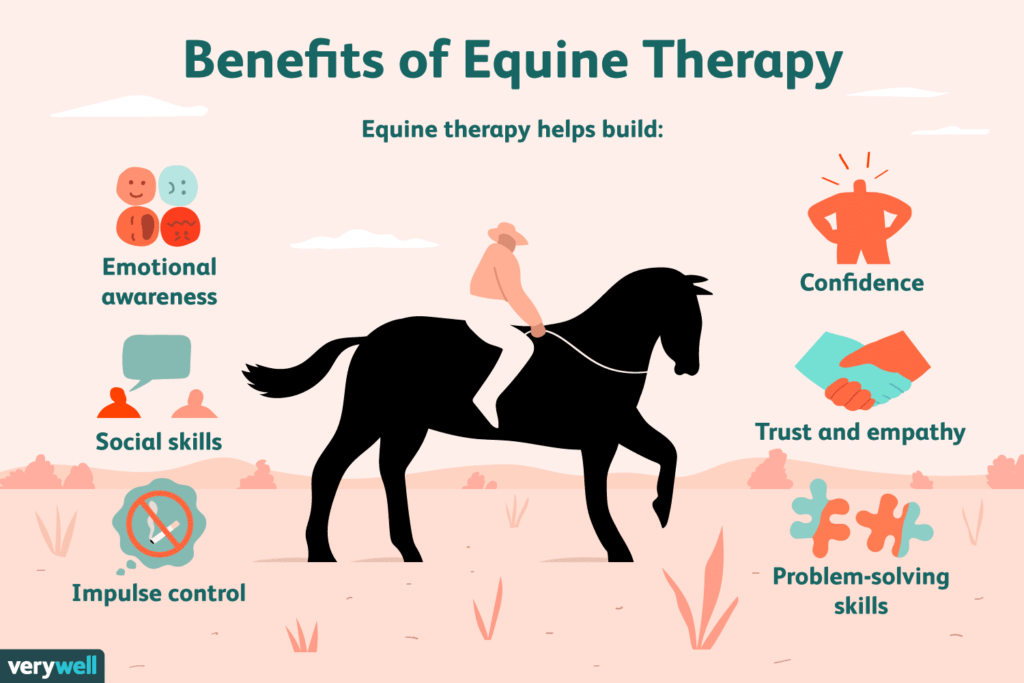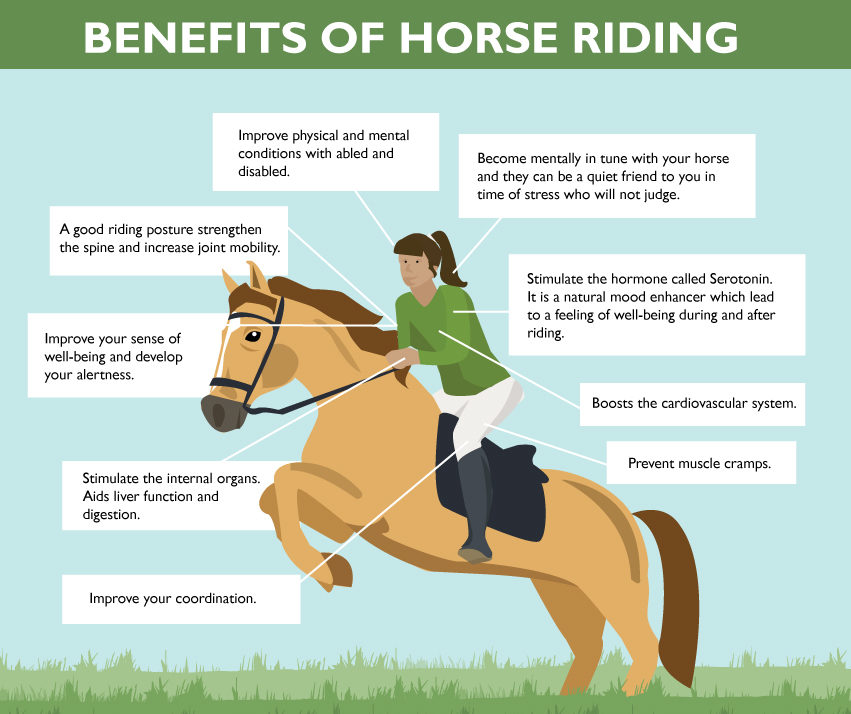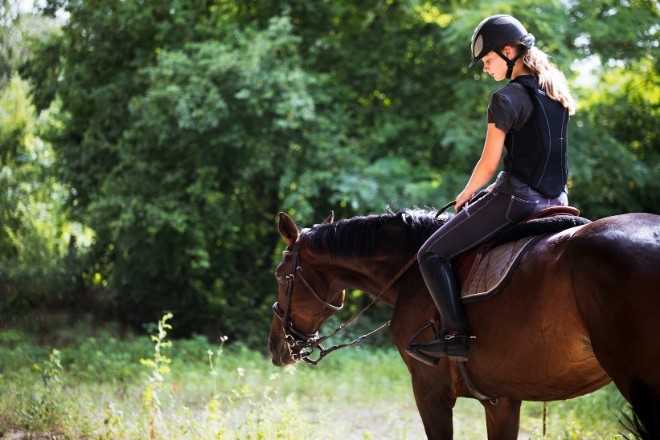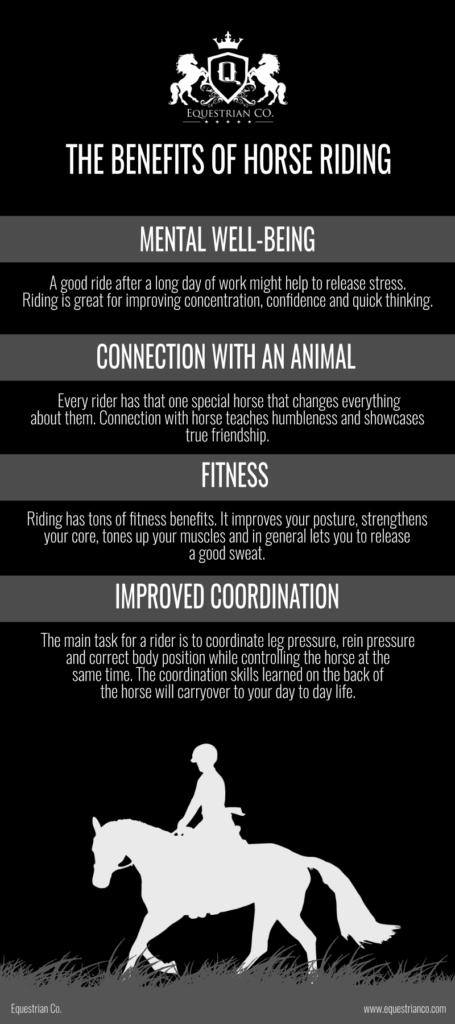Are you looking for a fun and exciting way to improve your mental well-being? Well, have you ever considered horseback riding? It might not be the first thing that comes to mind, but let me tell you, there are so many benefits that come with spending time in the saddle.
When it comes to mental well-being, horseback riding can be incredibly therapeutic. Building a relationship and connecting with a horse can be a truly rewarding experience. The bond that forms between you and your four-legged friend can provide a sense of companionship and support. Not to mention, being out in nature and enjoying the peacefulness of a trail ride can do wonders for reducing stress and anxiety.
And that’s just the tip of the iceberg! In my upcoming article on horsebackridingdude.com, I’ll dive deeper into the various ways horseback riding can benefit your mental well-being. From boosting confidence and self-esteem to improving focus and mindfulness, there is so much to explore. So stay tuned, because you’re in for a wild ride!
The Benefits of Horseback Riding for Mental Well-being
Horseback riding is not just an exhilarating and enjoyable activity, but it also offers a plethora of mental well-being benefits. Whether you are a seasoned equestrian or just starting out, the positive impact on your mental health can be profound. In this article, we will explore the various ways in which horseback riding can contribute to improving your mental well-being.

Improved Balance and Coordination
One of the physical benefits of horseback riding is the improvement in balance and coordination. As you ride, your body naturally adjusts and adapts to the movements of the horse. This helps strengthen your core muscles and increases your body’s overall stability. The constant need to balance on the horse’s back enhances your proprioception, which is the awareness of your body in space. This improved sense of balance and coordination can translate to better posture and body control in your everyday life.
Increased Muscle Strength and Endurance
Horseback riding is a physically demanding activity that engages multiple muscle groups throughout your body. The constant adjustments and movements required to stay balanced on the horse’s back work your leg muscles, core, and upper body. Over time, these muscles become stronger and more toned. Riding regularly also helps improve your endurance, as it requires a certain level of stamina to ride for extended periods of time. The combined effects of increased muscle strength and endurance contribute to improved overall physical fitness.
Improved Cardiovascular Fitness
Engaging in horseback riding is a great way to boost your cardiovascular fitness. Riding a horse elevates your heart rate, similar to moderate-intensity aerobic exercises. As you ride, you maintain a constant rhythm of movement, which helps increase your heart rate and promotes cardiovascular health. Regular cardiovascular exercise, such as horseback riding, can reduce the risk of heart disease, improve lung function, and enhance overall fitness levels.
Reduction in Stress and Anxiety
One of the most significant mental benefits of horseback riding is its ability to reduce stress and anxiety. Riding horses provides a unique opportunity to disconnect from the pressures of daily life and find solace in nature. Being in the company of horses and experiencing their calm presence promotes a sense of tranquility and relaxation. The rhythmic motions of the horse’s gait can also have a soothing effect on the mind, similar to the repetitive motions used in mindfulness meditation.
Enhancement of Self-confidence and Self-esteem
Horseback riding is a challenging activity that requires skill and confidence. As you learn to handle and ride horses, you gradually develop a sense of mastery and accomplishment. Overcoming the initial fear or apprehension of riding a powerful animal instills a newfound self-confidence. The bond and trust that you build with your horse further enhance your self-esteem. The ability to control and communicate effectively with such a majestic creature fosters a sense of empowerment and self-assurance.
Improved Mood and Overall Mental Well-being
Spending time with horses and engaging in horseback riding can have a positive impact on your mood and overall mental well-being. The release of endorphins, often referred to as “feel-good” hormones, during physical exercise contributes to a sense of happiness and contentment. The serene and peaceful environment in which horseback riding takes place creates an ideal setting for emotional rejuvenation and relaxation. Additionally, the sense of freedom and adventure associated with riding can help alleviate feelings of boredom or monotony in daily life.

Equine-assisted Therapy for Individuals with Disabilities
Horseback riding has been widely recognized as a beneficial therapeutic intervention for individuals with disabilities. Equine-assisted therapy, such as therapeutic horseback riding or hippotherapy, can help improve physical, cognitive, and emotional well-being. The rhythmic motions of the horse’s gait can stimulate and strengthen muscles, improve balance, and enhance coordination for those with physical disabilities. Additionally, the interaction with horses can promote emotional and social development, providing individuals with a sense of empowerment and achievement.
Equine-assisted Psychotherapy for Mental Health Issues
Equine-assisted psychotherapy is gaining popularity as a complementary form of therapy for individuals with mental health issues. Interacting with horses in a therapeutic setting can facilitate emotional expression, promote self-awareness, and enhance communication skills. The non-judgmental and empathetic nature of horses can create a safe environment for individuals to explore and process their emotions. Equine-assisted psychotherapy has shown promising results in treating conditions such as anxiety, depression, and post-traumatic stress disorder (PTSD).
Hippotherapy for Physical and Cognitive Rehabilitation
Hippotherapy, a form of equine-assisted therapy, focuses on using the horse’s movement as a therapeutic tool for physical and cognitive rehabilitation. The carefully controlled and strategic movements of the horse can help improve posture, muscle strength, and coordination in individuals with physical disabilities or impairments. Furthermore, the interaction with the horse requires cognitive engagement, stimulating cognitive processes such as attention, problem-solving, and memory. Hippotherapy can be particularly beneficial for individuals recovering from strokes, brain injuries, or other neurological conditions.
Improved Focus and Attention
Horseback riding demands a high level of focus and attention, which can ultimately improve these cognitive skills. To effectively communicate and work with a horse, you must pay attention to its subtle cues and signals. This level of attentiveness transfers over to other aspects of your life, enhancing your ability to concentrate and stay focused in different situations. Improved focus and attention have been linked to better academic performance, increased productivity, and overall mental sharpness.
Enhanced Problem-solving and Critical Thinking Skills
The complexity of horseback riding requires riders to think critically and make quick decisions. Each interaction with a horse presents unique challenges that require problem-solving skills and adaptability. Whether it’s guiding the horse through an obstacle course or adjusting your riding technique to address specific challenges, you constantly engage your problem-solving abilities. This ability to think critically and make split-second decisions can translate to improved problem-solving skills in other areas of life.
Increased Cognitive Flexibility
Cognitive flexibility refers to the ability to adapt to new situations, think creatively, and switch between different tasks or perspectives. Horseback riding, with its ever-changing environment and unpredictable nature, challenges your cognitive flexibility. As you navigate different terrains, adjust to the horse’s movements, and respond to unexpected situations, you train your brain to be adaptable and flexible. This cognitive skill is not only essential in equestrian activities but also in various aspects of life, such as work, relationships, and personal growth.

Development of Interpersonal Skills
Engaging in horseback riding provides ample opportunities for the development of interpersonal skills. Working with horses requires effective communication, empathy, and assertiveness. Clear and confident communication with the horse is essential for establishing trust and achieving desired outcomes. Interacting with other riders, trainers, or instructors fosters teamwork, cooperation, and the development of social skills. As you navigate the equestrian world, you have the chance to cultivate meaningful connections and build supportive relationships.
Opportunity for Social Interaction and Making Friends
Horseback riding offers a vibrant and inclusive community of equestrians who share a passion for horses and riding. Participating in riding lessons, trail rides, or competitions provides opportunities for social interaction and making friends with similar interests. Riding clubs and equestrian events bring together individuals from diverse backgrounds, fostering a sense of camaraderie and belonging. The shared experiences and common love for horses create a strong bond among riders, leading to lasting friendships.
Sense of Community and Belonging
The equestrian world is known for its close-knit and supportive community. Horseback riding provides a sense of belonging and a shared purpose among riders. The common love and respect for horses create a unique bond that transcends age, gender, or background. Whether you ride competitively or for leisure, you become part of a larger community that understands the joys and challenges of horseback riding. The support, encouragement, and sense of community that come with being an equestrian can contribute to overall mental well-being.
Opportunity for Emotional Expression and Release
Horseback riding can serve as a powerful outlet for emotional expression and release. The connection and bond formed with the horse create a safe and non-judgmental space to express and process emotions. The rhythmic motion of the horse’s gait can have a soothing effect, allowing you to let go of stress, tension, and negative emotions. Riding can also serve as a form of catharsis, enabling you to release pent-up feelings in a healthy and constructive way.
Development of Empathy and Compassion
Interacting with horses offers a unique opportunity to develop empathy and compassion. Horses are highly sensitive and intuitive animals that respond to human emotions. As you work with a horse, you learn to recognize and appreciate its needs, emotions, and boundaries. This heightened awareness of another being’s emotions cultivates empathy and compassion. Transferring these qualities to your interactions with humans can lead to more meaningful and compassionate relationships.
Enhanced Emotional Regulation
Horseback riding can help improve emotional regulation skills, which are essential for managing and controlling emotions effectively. Riding requires you to be calm and composed, as horses can sense and react to your emotional state. Learning to regulate your emotions and maintain a calm demeanor while riding can transcend into your daily life. This enhanced emotional regulation can have a positive impact on your relationships, decision-making, and overall emotional well-being.

Experience of Being in Nature and Enjoying the Outdoors
One of the unique aspects of horseback riding is the opportunity to immerse yourself in nature and enjoy the outdoors. Riding allows you to explore scenic trails, lush landscapes, and serene environments. This connection with nature has been shown to have numerous mental health benefits, including reduced stress levels, improved mood, and increased sense of well-being. The fresh air, natural surroundings, and the sounds of nature create a therapeutic environment that promotes relaxation and rejuvenation.
Bonding with Horses and Developing a Connection with Animals
The special bond between humans and horses is a cornerstone of horseback riding. As you spend time with horses, groom them, and ride them, a genuine connection and bond develop. This connection offers numerous psychological benefits, including reduced feelings of loneliness, increased feelings of companionship, and improved overall well-being. Horses have a unique ability to sense and respond to human emotions, providing a source of comfort, solace, and unconditional acceptance.
Immersing in the Therapeutic Presence of Horses
The presence of horses has a powerful therapeutic effect on individuals. Their gentle nature, calm demeanor, and intuitive responses create a serene and peaceful environment. Just being in close proximity to horses can have a profound impact on reducing stress, anxiety, and feelings of overwhelm. The therapeutic presence of horses has been utilized in various interventions, including equine-assisted therapy and equine-assisted psychotherapy, to promote emotional well-being and healing.
Engagement in Competitive Horseback Riding
For those seeking a challenge and a sense of achievement, competitive horseback riding offers a pathway for personal growth and development. Engaging in equestrian sports provides an opportunity to set goals, push boundaries, and strive for excellence. Competing in horse shows, dressage competitions, or show jumping events requires dedication, discipline, and perseverance. The pursuit of personal and competitive goals in horseback riding can enhance self-confidence, build resilience, and foster a sense of accomplishment.
Benefits of Exercise and Physical Activity in Sports
Horseback riding is not only a recreational activity but also a highly physical sport. Engaging in regular exercise and physical activity has numerous mental health benefits. Exercise is known to stimulate the release of endorphins, which are natural mood boosters. It can also reduce symptoms of anxiety and depression, improve sleep quality, and enhance overall cognitive functioning. The combination of physical exertion and the joy of riding provides a holistic approach to mental well-being.
Achieving Personal Goals and Personal Growth
Horseback riding offers endless opportunities for personal growth and the achievement of goals. Whether it’s overcoming fear, mastering a new riding technique, or competing at a higher level, each milestone reached contributes to personal development. Setting and achieving goals in horseback riding can boost self-confidence, improve self-esteem, and foster a sense of purpose. The journey of personal growth in horseback riding extends beyond the arena and can positively impact other aspects of life.

Overcoming Challenges and Building Resilience
The equestrian world is full of challenges, both physical and mental, that riders constantly face. From learning to ride and control a horse to overcoming obstacles in competitions, each challenge presents an opportunity for growth and resilience. Horseback riding teaches valuable lessons in perseverance, determination, and handling failure. The ability to overcome challenges and bounce back from setbacks is an essential life skill that contributes to mental strength and resilience.
Boosting Self-confidence through Accomplishments
Accomplishing milestones and achieving personal goals in horseback riding can significantly boost self-confidence. From successfully navigating a difficult jump to winning a competition, each achievement reinforces a sense of capability and self-assurance. The recognition of your progress and the validation received from peers and instructors further enhances your self-confidence and belief in your abilities. This increased self-confidence can have a positive ripple effect in other aspects of life, leading to the pursuit of additional challenges and achievements.
Learning from Failures and Setbacks
Horseback riding, like any sport, involves failures and setbacks. From falling off a horse to not achieving a desired result in a competition, these experiences offer valuable opportunities for growth and learning. The ability to reflect on failures, understand the lessons they offer, and persevere despite setbacks builds resilience and mental fortitude. Riding teaches riders to embrace failure as a stepping stone to success rather than a deterrent, fostering a growth mindset and a positive attitude towards challenges.
Equine-assisted Activities and Therapies in Specialized Programs
Equine-assisted activities and therapies are specialized programs that utilize horses to promote physical, cognitive, and emotional well-being. These programs are tailored to individuals with diverse needs, including those with physical disabilities, developmental disorders, or mental health issues. Equine-assisted activities encompass various non-riding interactions with horses, such as grooming, leading, or groundwork exercises. These activities can improve self-confidence, enhance social skills, and provide opportunities for personal growth.
Positive Impact on Individuals with Emotional or Behavioral Issues
Horseback riding and equine-assisted therapies have shown significant positive impacts on individuals with emotional or behavioral issues. The presence of horses can elicit feelings of calmness, trust, and safety, allowing individuals to explore and address their emotional challenges. The rhythmic motions of horseback riding can provide sensory input and regulation, helping individuals with sensory processing disorders or emotional dysregulation. The non-judgmental and empathetic nature of horses can create a therapeutic environment for emotional healing and personal growth.
Promoting Inclusion and Empowerment
The equestrian world is increasingly focusing on promoting inclusion and empowerment for individuals of all abilities. Horseback riding breaks down barriers and provides opportunities for individuals with diverse needs to participate in a sport that transcends physical limitations. Specialized programs and adaptive equipment allow individuals with disabilities to experience the joy and benefits of horseback riding. These inclusive initiatives foster a sense of empowerment, independence, and meaningful participation for individuals who may otherwise face limitations and exclusion.
Mindful Riding and the Connection between Horse and Rider
Horseback riding can be an immersive and mindful experience, fostering a deep connection between horse and rider. Mindful riding involves being fully present in the moment, in tune with your surroundings and the horse’s movements. This state of mindfulness allows for a deeper connection and communication with the horse, enhancing the overall riding experience. Mindful riding can be a form of meditation in motion, providing a sense of peace, clarity, and enhanced well-being.
Focus on the Present Moment and Sensory Awareness
When you are riding a horse, your focus shifts to the present moment, as you must remain attentive to the horse’s movements and cues. This heightened sensory awareness cultivates mindfulness and enables you to appreciate the intricacies of the riding experience. The sights, sounds, and sensations of horseback riding create a sensory-rich environment that engages all your senses. This heightened sensory awareness can provide an escape from the noise and distractions of everyday life, promoting relaxation and mental rejuvenation.
Benefits of Mindfulness for Mental Well-being
Mindfulness, the practice of being fully present and non-judgmentally aware of your thoughts and feelings, has been extensively studied for its mental health benefits. Engaging in mindful activities, such as horseback riding, can improve stress management, reduce symptoms of anxiety and depression, enhance emotional regulation, and promote overall mental well-being. Mindfulness techniques applied during horseback riding, such as focusing on your breath, grounding yourself in the present moment, and cultivating a non-judgmental attitude, can enhance these benefits.
Equestrian Activities as a Form of Stress Relief and Relaxation
Horseback riding and other equestrian activities are often used as a form of stress relief and relaxation. Engaging in physical exercise, being in nature, and interacting with horses create a tranquil and soothing environment. This environment allows you to disconnect from the demands of everyday life and find a sense of peace and rejuvenation. Riding can provide an escape from stress, worries, and overwhelming thoughts, promoting a state of relaxation and mental well-being.
Psychological and Physiological Effects of Spending Time with Horses
Spending time with horses has both psychological and physiological effects on your well-being. Physiologically, interacting with horses has been shown to reduce blood pressure, heart rate, and stress hormone levels. These physiological changes contribute to an overall sense of relaxation and well-being. Psychologically, the presence of horses can evoke feelings of joy, comfort, and gratitude, positively impacting your mood and mental state. The combination of these effects makes spending time with horses a therapeutic and enjoyable experience.
Therapeutic Qualities of Horseback Riding
Horseback riding possesses inherent therapeutic qualities that benefit mental well-being. The unique bond formed between horse and rider creates a safe and nurturing environment for emotional expression and growth. The rhythmic motions of horseback riding can induce a state of relaxation and calmness, reducing stress and anxiety. The opportunity to connect with nature, experience its beauty, and enjoy the outdoors promotes a sense of peace and rejuvenation. These therapeutic qualities make horseback riding an ideal activity for enhancing mental well-being.
Opportunity for Rejuvenation and Self-care
Horseback riding retreats and getaways offer a unique opportunity for rejuvenation and self-care. These retreats combine the pleasure of horseback riding with wellness activities, relaxation, and self-reflection. Engaging in horseback riding in scenic and peaceful environments allows you to disconnect from daily stressors and focus on self-care. These retreats often offer additional amenities, such as spa treatments, yoga sessions, or guided meditation, further enhancing the rejuvenating experience.
Experience of Horseback Riding in Scenic and Peaceful Environments
Horseback riding provides the chance to explore and experience scenic and peaceful environments. Riding through picturesque trails, open fields, or along the beach immerses you in nature’s beauty. These serene surroundings create a peaceful and therapeutic backdrop for horseback riding. The tranquility of the natural environment, coupled with the rhythmic sound of hoofbeats, can have a profoundly calming and soothing effect on the mind, promoting mental well-being.
Combining Wellness Activities with Horseback Riding
Combining wellness activities with horseback riding creates a holistic approach to mental well-being. Many equestrian centers and retreats offer additional wellness services that complement the riding experience. These may include yoga classes, meditation sessions, massage therapy, or mindfulness workshops. The integration of these wellness activities with horseback riding enhances the therapeutic benefits, fosters relaxation, and promotes a sense of overall well-being.
In conclusion, horseback riding offers a multitude of mental well-being benefits. From improved balance and coordination to reduced stress and anxiety, the positive impact on mental health is undeniable. Engaging in horseback riding provides the opportunity for personal growth, emotional expression, and connection with nature and animals. Whether through equine-assisted therapy, competitive sports, or leisurely rides, horseback riding has the potential to enhance your overall mental well-being. So saddle up, enjoy the ride, and experience the transformative benefits of horseback riding for yourself.
For more information on horseback riding and to explore other topics related to this exhilarating activity, visit horsebackridingdude.com.